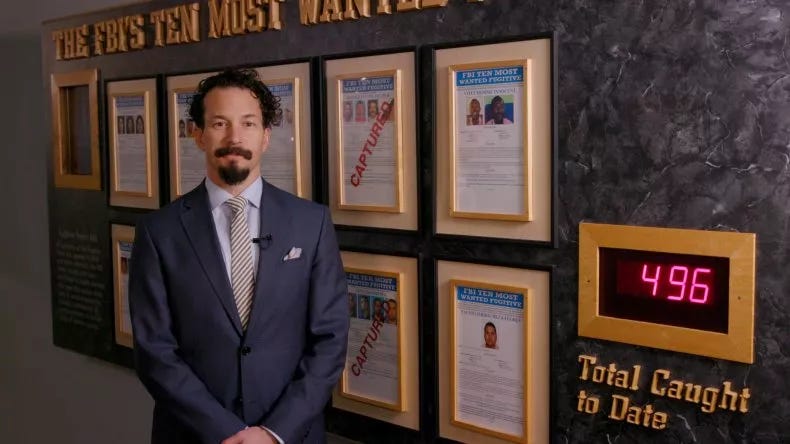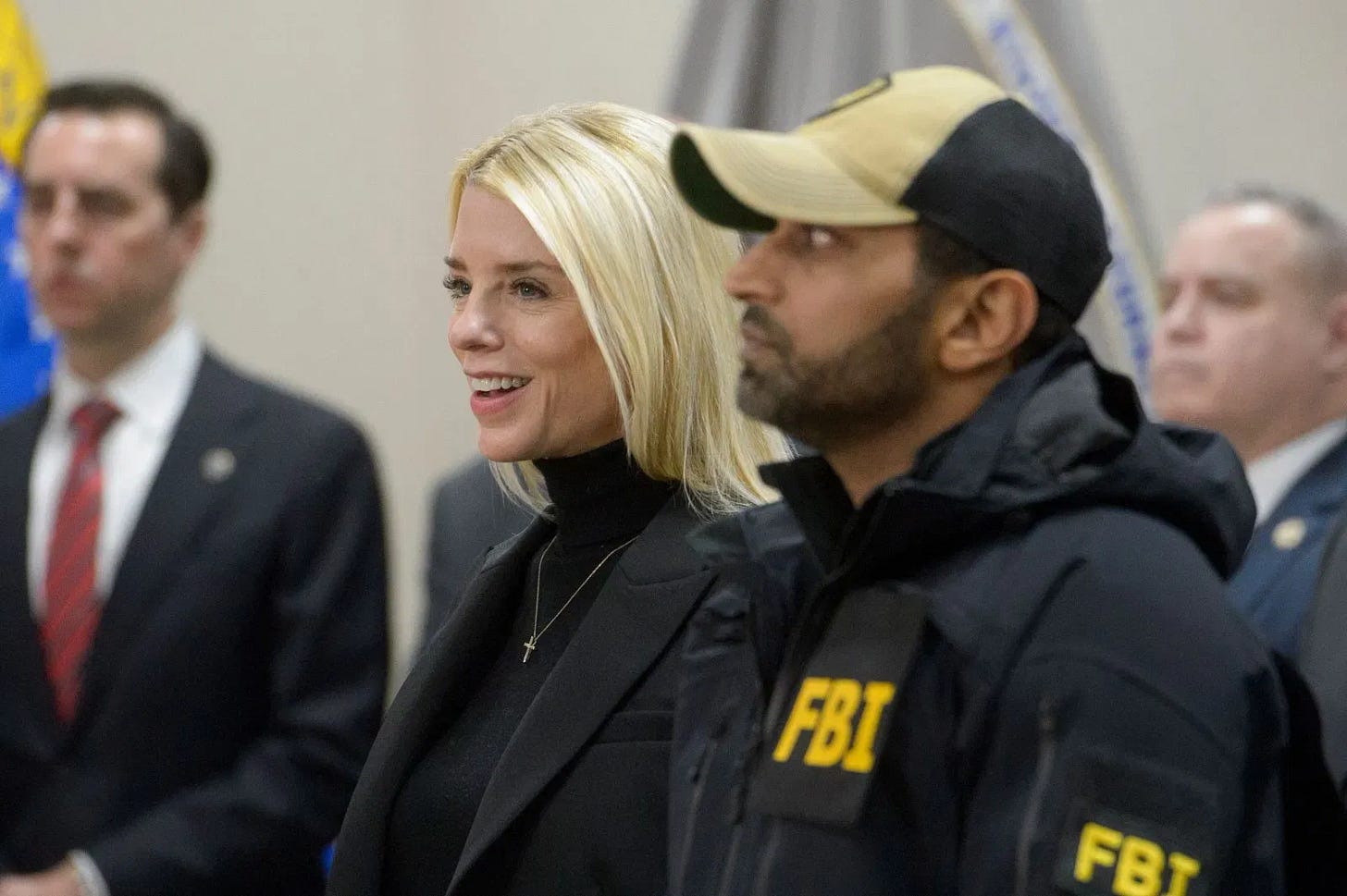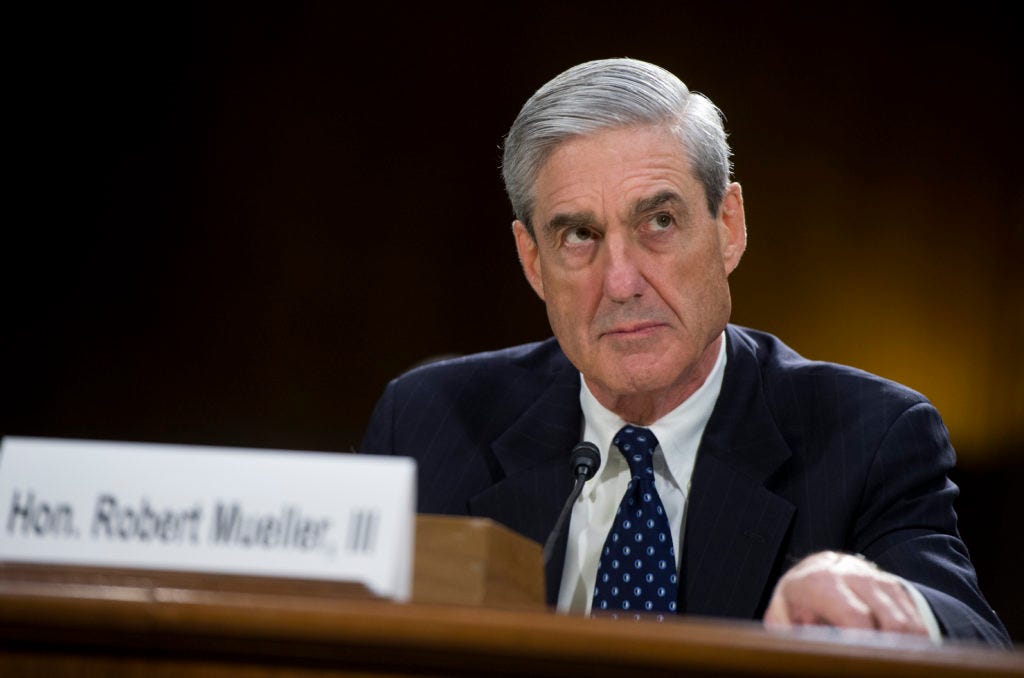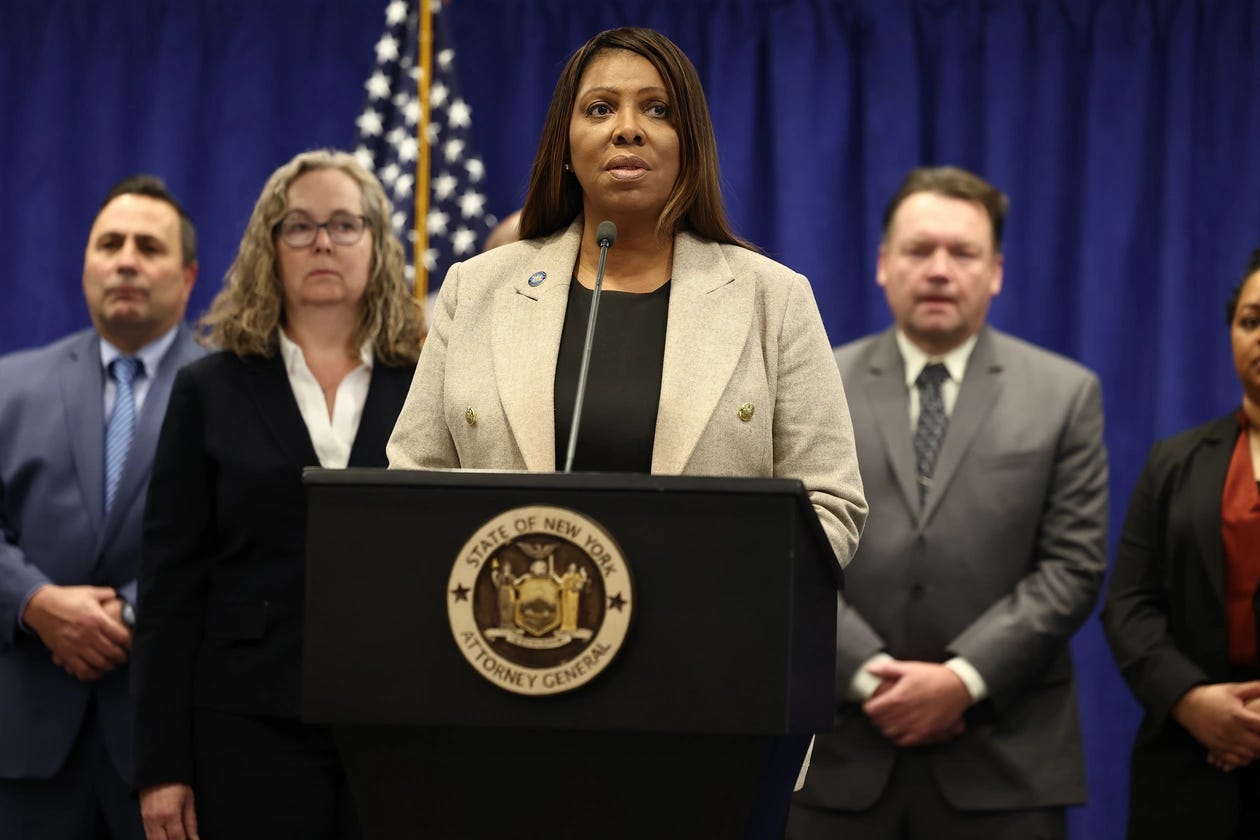Loyalty First, Law Second
An FBI official said no. Here’s what happened:
When veteran FBI agent Brian Driscoll became acting FBI director in January, he found himself in an impossible position. The Trump administration demanded he hand over the names of thousands of agents who had worked on January 6 investigations. Driscoll refused. Within days, he was accused of "insubordination" by Justice Department officials.
Last week, Driscoll was fired from the FBI. No cause was given, but the reason was crystal clear to everyone watching: Driscoll had put his oath to "support and defend the Constitution of the United States against all enemies, foreign and domestic," above obliging the requests made by the president’s team.
Brian Driscoll’s termination represents more than just another casualty in the ongoing war on federal law enforcement. It embodies a new vision of the Department of Justice: one that exists as a personal law firm for the president and takes actions at his direction rather than maintaining its relative independence. In fact, Attorney General Pam Bondi has referred to DOJ lawyers as “the president’s lawyers.”
Trump has also escalated his control over Washington, DC, itself, declaring a public safety emergency in order to seize control of the city's police department and deploy National Guard troops. Trump painted a dystopian picture of "bloodthirsty criminals" and "roving mobs" plaguing the district, but this portrait contradicts official data that shows crime at a 30-year low.
“This is liberation day in DC and we’re going to take our capital back,” Trump said.
His administration has put Attorney General Pam Bondi in charge of the city’s police and reassigned 120 FBI agents from their regular duties to patrol work in the capital. These agents are highly trained counterintelligence and public corruption specialists with expertise in things like terrorism and criminal wire fraud, but they are now dealing with property crime and other problems that are usually the domain of local police.
The Justice Department's own regulations and guidelines establish prosecutorial independence, which are meant to keep law enforcement decisions separate from political ones. But the FBI's institutional record includes notable problematic periods: J. Edgar Hoover wielded excessive authority for decades as FBI director, and President Richard Nixon used the bureau for political surveillance during the Watergate scandal.
Following Nixon's resignation, these abuses prompted comprehensive reforms. In 1978, Attorney General Griffin Bell gathered Justice Department lawyers to address Watergate's aftermath, noting that the scandal had "given rise to an understandable public concern that some decisions at Justice may be the products of favor, or pressure, or politics."
Bell established three bedrock principles: ensuring that personal or partisan interests don't influence legal judgments; increasing transparency in decision making; and strictly limiting contact between department staff and White House or congressional officials to prevent undue influence on litigation decisions. These post-Watergate reforms created the framework of Justice Department independence that every president since the 1970s largely respected — until now.
President Trump has taken a very different approach, explicitly emphasizing that he views loyalty as the FBI's primary obligation. As far back as 2017, reports indicated that Trump requested then–FBI Director James Comey's loyalty during a private dinner soon after taking office. Comey later testified that Trump told him, "I need loyalty, I expect loyalty." Trump denied the allegation.
During Trump’s first term, he had to work around officials who tried to deflect his more extreme demands. But now he has Justice Department leadership that proudly characterizes itself as working directly on his behalf.
Key figures like Deputy Attorney General Todd Blanche and former Principal Associate Deputy Attorney General Emil Bove (who is now a federal judge) previously served as Trump's personal defense lawyers, raising questions about whether the president's private interests remain their priorities over the nation's law-enforcement apparatus.
This transformation has been aided by the Supreme Court's presidential immunity ruling, which held that Trump has "exclusive authority over the investigative and prosecutorial functions of the Justice Department." The decision effectively gives Trump — and any future president — legal cover to misuse the department without worrying about future criminal liability.
The loyalty apparatus
To understand how we arrived at this moment, we must trace back to Trump's sustained campaign of accusations that federal law enforcement was conducting a "witch hunt" and engaging in "unprecedented, third-world weaponization of prosecutorial power."
These claims began early in Trump’s first term, when former FBI Director Robert Mueller was appointed to investigate claims of Russian election interference in Trump’s behalf. They gained momentum after Trump faced multiple federal indictments in 2023 — including federal charges for attempting to overturn the 2020 election and mishandling classified documents at Mar-a-Lago. He and his supporters insisted the prosecutions were politically motivated and designed to damage his 2024 campaign. After Trump was elected as president again, the DOJ abandoned these cases and they were dismissed in court."
"Look, when this election is over, based on what [political enemies] have done, I would have every right to go after them," Trump told Fox News in 2024
Biden's controversial pardon of his son Hunter in December seemed to validate Trump's strategy. "Joe Biden's pardon of Hunter Biden proves President Trump's signature campaign promise to end the weaponization of our justice system needs to happen," Trump press secretary Karoline Leavitt said on Fox News the day after the pardon was announced.
To lead his transformation of the Justice Department in his current term, Trump installed former federal prosecutor Kash Patel, a hyperpartisan Trump loyalist, as director of the FBI. Before taking the job, Patel had branded FBI agents "political jackals" and called the bureau "an existential threat to our republican form of government."
In his first term, Trump tried to install Patel as deputy director of the FBI, the No. 2 job at the bureau. The attorney general, William P. Barr, objected. Barr writes in his memoir that he told then–White House Chief of Staff Mark Meadows that Patel would get the deputy job “over my dead body.”
Patel “had virtually no experience that would qualify him to serve at the highest level of the world’s preeminent law enforcement agency,” according to Barr. “The very idea of moving Patel into a role like this showed a shocking detachment from reality.”
The current No. 2 at the FBI, Dan Bongino, is a former Secret Service agent and podcaster who has described the FBI as "the single most corrupt law enforcement institution" in America.
Together, Patel and Bongino have turned the bureau into something resembling a loyalty-testing ground, complete with the purges and polygraph examinations designed not to root out security threats but to identify agents who might have spoken negatively about their new bosses.
Just 11 days into President Trump's second term, his administration removed eight senior managers at the FBI from their positions, including those leading divisions responsible for national security, cybersecurity, and criminal investigations. According to then–Acting Deputy Attorney General Emil Bove, these officials were dismissed because they were deemed unable to “assist in implementing the President's agenda faithfully.” Some of them had previously been involved in cases related to January 6 defendants or had participated in investigations concerning Mr. Trump.
But the targeting extends beyond those who worked on Trump investigations. This became clear when another batch of agents was forced out in June. Spencer Evans, who ran the Las Vegas field office, was transferred after Trump supporters accused him of denying religious exemptions for Covid vaccines. Michael Feinberg, a longtime counterintelligence agent, resigned after being threatened with demotion simply because he was friends with Peter Strzok, the former agent who had sent text messages critical of Trump.
"Under Patel and Bongino, subject matter expertise and operational competence are readily sacrificed for ideological purity and the ceaseless politicization of the work force," Feinberg wrote after his departure.
But now, DOJ has created a "Weaponization Working Group" to investigate Special Counsel Jack Smith, who led FBI investigations related to January 6 and Trump’s retention of classified documents; New York Attorney General Letitia James, who oversaw a state prosecution of Trump for falsification of business records as part of a hush-money payment; and California Senator Adam Schiff, who as a House member was the lead prosecutor in Trump’s first impeachment trial.
Law enforcement as a political weapon
The transformation isn't just about personal grudges, though. It’s also about the use of federal law enforcement to advance Trump’s agenda, especially on immigration.
Under Patel and Bongino, the FBI has reassigned hundreds of highly trained career agents from counterterrorism, foreign espionage, and public corruption investigations to immigration enforcement. Agents with advanced degrees and specialized training now spend their days hunting down undocumented immigrants with no criminal records to meet Trump's arbitrary quota of 3,000 arrests per day.
Bondi also ordered prosecutors to drop corruption charges against New York City Mayor Eric Adams, claiming that prosecution would prevent Adams from giving his "full attention and resources" to Trump's immigration agenda. Nearly a dozen prosecutors resigned in protest rather than participate in what they saw as a corrupt political bargain
The cost of the purges
More is at stake than careers destroyed and democratic norms shattered. When experienced counterintelligence agents leave, foreign adversaries gain an advantage. When cybersecurity experts are reassigned to immigration raids, hackers operate with less fear of detection. When public corruption units are decimated, corporate criminals and dirty politicians breathe easier.
The ongoing purges and resignations have created significant gaps in divisions tasked with public safety responsibilities. According to longtime New York Times law enforcement reporter Adam Goldman, these personnel losses have "eliminated decades of accumulated expertise in national security and criminal investigations within the FBI."
A former Justice Department official told NBC News that the thinning out of senior FBI ranks had left the agency "completely unprepared to respond to a crisis, including the fallout from the current conflict in the Middle East," because fewer experienced agents would be on hand to prevent potential terror and cyberattacks from Iran.
There is a dangerous irony in Trump’s approach. Ryan Crosswell, who resigned in protest over the Eric Adams case, captures it well: "Even if you did think that [the Justice Department] was weaponized” against Trump before his current term, “the correction to weaponizing the department is not to do it yourself."
Trump spent years claiming the FBI was "weaponized" against him. Now he's turning it into the very thing he accused it of being: a political enforcer rather than a servant of the rule of law.
Brian Driscoll understood this when he refused to hand over those lists of agents' names. He knew that protecting his colleagues meant protecting something larger: the principle that in America, no one — not even the president — is above the law.
Whether that principle survives will depend on whether enough Americans are willing to defend it, even when doing so comes at a personal cost.











Thank you, Sharon.
I feel for the thousands of people who joined the Bureau (or just about any federal agency) with the goal to protect and serve. They have all made considerable sacrifices and pledged to protect our country from all enemies foreign and domestic only to find that the call is coming from inside the house.
I can’t imagine their pain at having to choose between staying in an untenable situation with the hope of righting the ship or leaving to uphold their oath.
History will not look back kindly on this time. Thank you for helping us all find ways to make a difference.
I fail to understand this administration’s logic — how everyone and everything else is the enemy except for the very administration that is hollowing out every protection our country has built over time. To what end? The very downfall and destruction of our nation? Every day is like watching a train wreck, powerless to stop it. It’s difficult to do more than simply prepare to take cover from the fallout.